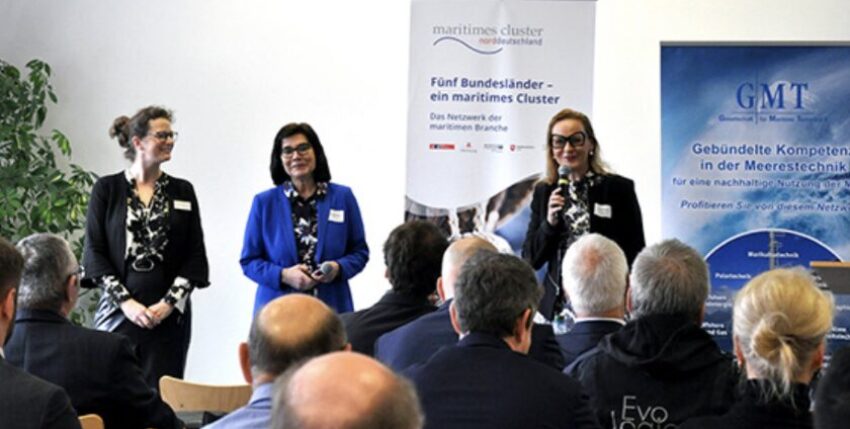From a press release by GMT, MCN and SMN
On 11 April 2024, the event "Munitions in the sea - perspectives and value creation potential" took place in Rostock-Warnemünde under the organisation of the Gesellschaft für Maritime Technik e. V. (GMT), the Maritime Cluster Norddeutschland e. V. (MCN) and the Subsea Monitoring Network e. V. (SMN). The focus was on the German government's immediate action programme "Ammunition Waste in the North and Baltic Seas" (2023-2025). The aim of the programme is to create the conditions for a systematic start to the industrial removal of munitions waste in German marine areas. The munitions that have lain at the bottom of the North Sea and Baltic Sea for decades pose a threat to the population and the environment - an estimated 1.6 million tonnes in German waters alone.
Dr Wolfgang Sichermann (Seascape GmbH), who is coordinating the immediate action programme on behalf of the Federal Ministry for the Environment, Nature Conservation, Nuclear Safety and Consumer Protection (BMUV), explained the current status of the pilot project for clearing ammunition dumpsites and the development of a mobile floating facility for disposal. In addition, critical process steps were highlighted that require further innovative solutions in order to achieve scaling and increased performance in the overall process in the future. The aspects of salvage, processing and disposal, data management and the potential for the global market were also discussed. The participants used the dialogue to ask questions, make suggestions and provide technical input, but also to make critical comments. One thing became clear: by networking the stakeholders with their expertise, further necessary steps can be identified and implemented, provided that reliable long-term funding is available. This can pave the way for successful large-scale salvage and disposal of old munitions in the North Sea and Baltic Sea.
The great interest in this topic was impressively reflected in the participation of over 120 representatives from business, science and politics.
Petra Mahnke, Deputy Chairwoman and Managing Director of the Gesellschaft für Maritime Technik e.V. (GMT)"The clearance of munitions in the North Sea and Baltic Sea is a generational task for politics and society. We must finally create the conditions for comprehensive salvage in order to reduce the risks to the environment and the population. The immediate action programme is an important first step that must be implemented swiftly and must be seamlessly followed by others, i.e. the Federal Government must work to ensure that further funds are reliably made available for large-scale clearance in order to create investment security for companies on the one hand and to secure Germany's pioneering technological role in the recovery of munitions in the sea on the other.
Katrin Caldwell, Deputy Managing Director of the Maritime Cluster Northern Germany e. V. (MCN) and Head of the Mecklenburg-Vorpommern office: "We want to get into action. Once the political framework is in place, the primary goal of the MCN is to bring together stakeholders from different sub-sectors and work on joint projects to actively start clearing munitions and create business cases."
Uta Hermes, Head of Network Management of the Subsea Monitoring Network e.V. (SMN): "The aim of this event was for the stakeholders to exchange ideas on how they can jointly contribute their expertise and engage in intensive dialogue so that the demilitarisation of the North Sea and Baltic Sea can be tackled by companies from the region."
The Society for Maritime Technology (GMT) represents the interests of German companies and research institutions in the field of marine technology vis-à-vis the public and political decision-makers throughout Germany. It networks its members from industry and science in order to initiate national and international research projects and supports the development of innovative products and services as well as the opening up of new market segments at home and abroad. With a wide range of services, members benefit from a unique network with bundled marine technology expertise. Marine technology develops, produces and utilises technologies for the exploration, protection and sustainable use of the oceans. More information
The maritime industry in all its facets - shipbuilding, suppliers, marine technology, shipping, offshore and more - has impressive potential for the future and has a decisive influence on economic development in the north. The Maritime Cluster Northern Germany (MCN) is the focal point for promoting and strengthening the maritime industry. By pooling resources across federal state borders and initiating cross-sector collaborations and projects, the MCN helps to increase the potential for success. Its expertise ranges from finding innovation partners to providing individual information on funding programmes and establishing important contacts in the maritime industry. The MCN promotes cross-industry knowledge transfer and networking through high-quality specialist events, workshops and creative event formats. More information
The Subsea Monitoring Network e.V. (SMN) is a leading corporate network for underwater technologies in Germany and a nationwide point of contact for marine research and technology in Germany. SMN sees itself as the supporting organisation and management of the Ocean Technology Campus Rostock, which plays a leading role in maritime and marine research in the region. SMN is a platform for the entire value chain of the industry and is committed to strengthening it through active lobbying, networking, pooling of information and expertise. As a network for underwater technologies, we are particularly available for questions relating to technology developments and technology testing and facilitate contact with industry companies, universities, research institutions, testing facilities and test fields, and politics. More information







